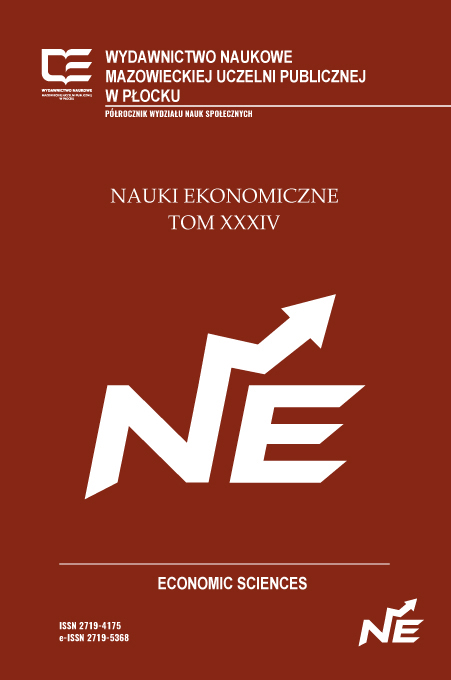SOCIAL ENTREPRENEUR SCHOOL IBS AND PEDAGOGICAL SCIENTIFIC LEARNING: EXPERIENCE AT FIL. DR. JAN-U. SANDAL INSTITUTE
DOI:
https://doi.org/10.19251/ne/2021.34(1)Keywords:
Internship, Innovation, Management, Pedagogy, Social EntrepreneurshipAbstract
Pedagogy denotes the way the teachers apply in teaching. It is also the beliefs of educators and concern about interplay between culture and different ways of teaching and learning process. Social entrepreneurship in contrast to the traditional types of entrepreneurship, tries to connect the passion to do new things for common cause with the given economic environment. Critical difference in social and traditional concept of entrepreneurship can be seen from the viewpoint of founding mission of the entrepreneurship and the market impression. Pedagogical methods in social
entrepreneurship education help to enhance learning performance potential of entrepreneurs. In dynamic innovative learning, both the professors and potential entrepreneurs as students are innovative. This paper is based on the pedagogical internship experience on social entrepreneurship. The basic purpose is to highlight the internship undergone as well as to delve into the understanding of the dynamic pedagogical learning process. Review of literature on pedagogical learning and direct involvement of the author in the virtual classes of Social Entrepreneur School IBS is the basic methodology employed for this paper. This paper concludes with the finding that a well-planned and well-designed pedagogy not only improves teacher’s performance but it is very important to increase the students learning and outcomes. Dynamic and innovative pedagogical learning can be ensured where the influencing factors are properly considered.
References
Albors-Garrigos, J., Igattua, J. I., & Peiro, A. (2018, August 15). Innovation Managemeent Techniques and Tools: Its Impact on Firm Innovation Performance. International Journal of Innovation Management; World Scientific Publishing Company. https://doi.org/10.1142/S1363919618500512
Cherry, K. (2020). B. F. Skinner: Biography of the Behaviorist Thinker. Verywellmind. https://www.verywellmind.com/b-f-skinner-biography-1904-1990-2795543
Davies, P., & Mangan, J. (2006). Embedding Threshold Concepts: from theory to pedagogical principles to learning activities. Paper Presented at the Threshold Concepts within the Disciplines Symposium, Glasgow,. https://citeseerx.ist.psu.edu/viewdoc/download?doi=10.1.1.538.8030&rep=rep1&type=pdf
Ferdousi, F. (2017). Understanding Consumer Behavior toward Social Enterprise Products. Consumer Behavior - Practice Oriented Perspectives. https://doi.org/10.5772/INTECHOPEN.68743
Gandhi, T., & Raina, R. (2018). Social entrepreneurship: the need, relevance, facets and constraints. Journal of Global Entrepreneurship Research 2018 8:1, 8(1), 1–13. https://doi.org/10.1186/S40497-018-0094-6
Govindasamy, T. (2002). Successful implementation of e-Learning:: Pedagogical considerations Successful implementation of e-Learning Pedagogical considerations. Pergamon, 4, 287–299.
Kerlin, J. A. (2010). A comparative analysis of the global emergence of social enterprise. Voluntas: International Journal of Voluntary and Nonprofit Organizations, 21(2), 162–179. https://doi.org/10.1007/s11266-010-9126-8
McLeod, S. A. (2018a). Classical Conditioning | Simply Psychology. SimplyPsychology. https://www.simplypsychology.org/classical-conditioning.html
McLeod, S. A. (2018b). Operant Conditioning (B.F. Skinner) | Simply Psychology. SimplyPsychology. https://www.simplypsychology.org/operant-conditioning.html
Sandal, J.-U. (2004). Sosialt Entreprenørskap. Lund Papers in Economic History, Lund Papers in Economic History ISSN 1101-346X ISRN LUSADG-SAEH-P--04/96--SE+20, 96. www.ekh.lu.se
Sandal, J.-U. (2013). Social Entrepreneurship in Theory and Practice: Promoting Entrepreneurship in Different Social Groups. Role of Higher Education Institutions in Sociiety: Challanges, Tendencies and Perspectives Academic Papers Alytus College, Academic Papers, Nr.1(2). http://www.akolegija.lt/
Sandal, J.-U. (2017). Innovatin in Education-dynamic Innovative Learning Method as Approache to Independent Science. In Ukraine – EU. Modern Technology, Business and Law : collection of international sci- entific papers : in 2 parts. Part 1. Modern Priorities of Economics. Societal Challenges. – Chernihiv : CNUT, 2017. – 190 p. ISBN 978-966-2188-73-8.
VIC. (2020). The Pedagogical Model Curriculum planning and assessment. https://www.education.vic.gov.au/Documents/school/teachers/teachingresources/practice/pedagogicalmodel.pdf
